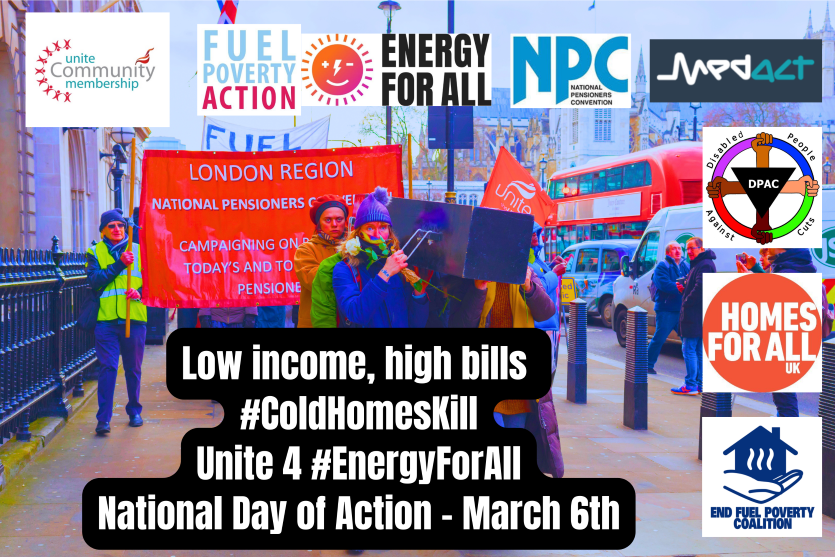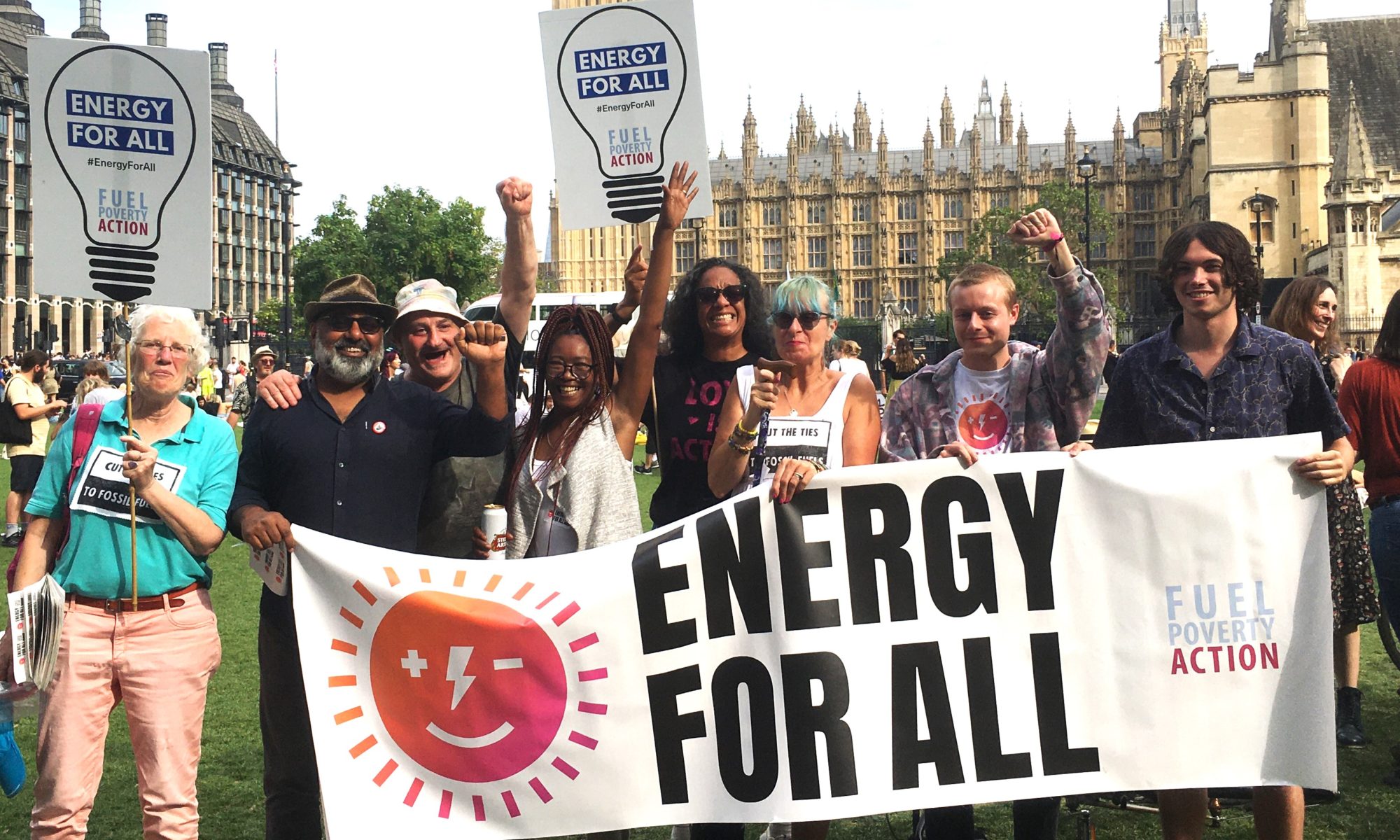On 26 May Rishi Sunak announced a £15 billion package of support for people struggling with energy bills, and although he didn’t dare say its name, a windfall tax on oil and gas companies’ current extraordinary profits.
The windfall tax, called a temporary “Energy Profits Levy” was expected. The size of the support package was something of a surprise, a measure of the depth of the crisis the UK population is facing, and the depth of the crisis of the current government, which has, with impunity, partied while people die. The End Fuel Poverty Coalition, of which FPA is a member, has outlined numerous potholes in the distribution of these funds – operational issues for some renters, Prepayment Meter users, and others that could prevent some people from receiving what they are entitled to. We will be Below we focus on the amounts.
The key offerings were:
£400 for every bill-payer and people on Prepayment Meters.
£650 each for the 8 million households surviving on welfare benefits,
£300 for pensioner households, and
£150 for households who get non-means-tested disability benefits
Many people can qualify for more than one, or even all of these sums. The chancellor has repeatedly claimed verbally that “most” people will get £1,200. The government’s website is more cautious: almost all of the eight million most vulnerable households across the UK will receive support of at least £1,200 this year.
There was enough in the package to warrant considerable relief, and even joy at this new proof that, after all, the government can move when pushed. Some people have dared to hope that the fuel poverty crisis is solved now. But unfortunately that is very far from the case. Lasting progress will require structural changes to our homes, our energy supply and the pricing system – like Energy For All, which will guarantee that every home has enough energy, free, to meet its basic needs. Instead, the Chancellor’s handouts will enable some to eat today – and go hungry again tomorrow. Here’s the context:
- The starting point. The levels of poverty are now so high in this country that even sums that are high, for a giveaway only take the tip off the iceberg. The UK spends far less on pensions than other OECD countries. Over two million families last year were forced to turn to food banks, up 80% on five years ago, and in many of these homes parents were working two or even three jobs to try to get by. Missing meals and rationing heat to an hour or less a day, many have not dared to put a kettle on, let alone cook a hot meal. With UK homes the worst insulated in Europe many are paying over the odds to heat houses and flats that never really stay warm or even dry. In terms of fuel costs alone, £1200 more than cancels out the expected £800 increase next October, but doesn’t approach negating the £1,500 total with the increase this spring, let alone what could happen next January, with Ofgem’s accelerated increase timetable. We cannot forget that the £1500 is an average – it is more for people on prepayment meters, and much more for people in bad housing, forced to pay to heat the streets. And we can’t forget, either, that BEFORE these increases, even before the pandemic, 10,000 people in the UK died each winter from fuel poverty.
- Aside from the increasing fuel prices, people are facing massive increases in food costs, clothing, housing costs, transportation, and also, by the government’s choice, NI increases and real-terms cuts in benefits. Benefits increased by 3.1% in April, with consumer price inflation at 9%. The Chancellor’s “generous” £650 for people on means tested benefits goes a bit over half way towards making up the £20 per week ripped last October from people on UC – and never even extended to people on legacy benefits. There’s an extra £150 for people on disability benefits that are NOT means tested, but they are also to lose access to the Warm Home Discount, worth £150.
- Meanwhile, working age people who are not on any benefits will get £400, which doesn’t go far against a £1500 increase. Where does that leave people who were working 2 or 3 jobs but were still struggling to make ends meet before the need to find hundreds of pounds more to pay for energy? The Chancellor keeps saying that benefits will rise with inflation in the autumn – and inflation, he says confidently, will then fall (would he count on that if his own family were affected?) It’s true that in this very low waged economy many people in “good” jobs are also recipients of benefits. But that is by no means true of all. For the many one or two income households who earn just over the benefits threshold, there is a cliff edge to climb – they get only £400 and nothing more. Unlike a tax system that is graduated so people benefit from allowances in some proportion to what they need, your fate with the Chancellor’s helicopter money, as with so much else these days, depends on arbitrary cut off points, and luck.
- The monies do nothing about the gross injustices built into the pricing system. Because of the recently hugely increased standing charge on bills, you pay more per unit if you use less energy than if you are wealthy and profligate. No matter how much you cut down you can’t avoid the standing charge, which now carries the burden of covering the costs of failed, poorly regulated, energy suppliers. In addition, people on prepayment meters – often forced to have one installed because they’ve fallen into debt – pay more than people who can pay by Direct Debit.
- The handouts, however welcome, are a one-off. They may of course be repeated if the government again finds itself under sufficient pressure. But the total insecurity of having to wait in hope of such an event will drive many to despair, with all the implications for mental illness, suicides, demotivation, and sad, hard, unnecessary decisions being made to give up hope of a home, a course, a holiday, a business plan, or even a child because people in this country just can’t count on anything.
- The handouts will go not only to people who need them but to people who are already very wealthy and do not by any stretch of the imagination need help with their bills. FPA’s planned “Energy for All” is also universal, but would be balanced by higher tariffs for people who are using far more energy than they need. The Government’s suggestion that individuals can ‘donate to charity’ in no way deals with the injustice of giving public money to people who may already be profiting from the crises that are pushing the rest of us to desperation.
Meanwhile, how is this all funded, and what of the Windfall Tax? Well, a 25% levy on the extraordinary profits that energy companies are raking in from our bills is due to raise £5 billion of the £15 billion pounds being spent on returning cash to households. (Interesting that they can find the rest from somewhere.) But at the same time, the Chancellor has promised these same companies that if they “invest in the UK” – and specifically in oil and gas – they will get back over 91p for every pound invested. In their own businesses, that is. Promised up to 2025, at £1.9 billion per year this has been estimated to give them £5.7 billion (no official figures available). The government is taking with one hand, then, and giving back generously, with the other – as a bribe to induce profit-sated multinational corporations to further drill for oil, pollute the air, water, land and sea, and destroy the climate that we all depend on. Rishi Sunak’s tax breaks could lead to more than £8bn worth of North Sea energy projects.
In any case, a tax worth £5 billion from £13.4 to £13.6 billion of windfall profits, still leaves eight and a half billion pounds in the hands of these corporations. That money – unearned, and created by the extra high prices we have paid – will go to people so obscenely wealthy that they don’t know what to do with it, and to further destruction of planet earth. Yet that money could have made a huge difference to our bills and our health. Just £3 billion could insulate over 2 million homes.
All this on top of the ongoing enforced generosity of the British taxpayer who gives more in subsidies to the likes of BP and Shell than we take from them in taxes. In normal times the UK government taxes oil and gas producers 40% on profits from North Sea extraction. This is the lowest government tax take in the world from an offshore oil and gas regime. Even with this temporary levy, the tax rate on oil and gas companies in the UK will still be lower than the global average.
Out of sight of the headlines, then, the champagne corks were no doubt popping in corporate boardrooms where billionaire CEOs weighed up the Chancellor’s statement. In millions of kitchens, meanwhile, their customers splurged by finally turning the kettle on and making a nice cup of tea.






